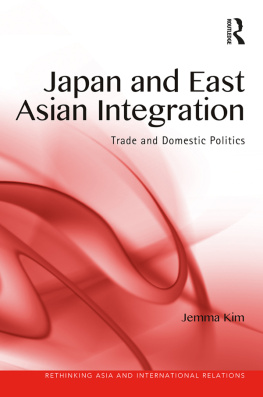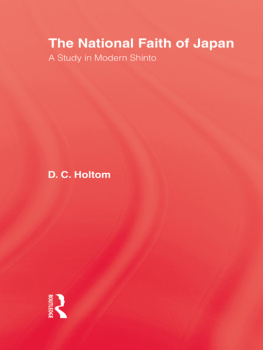NATIONAL INTEGRATION AND LOCAL POWER IN JAPAN
To my parents
Misao Takao and Haruo Takao
First published 1999 by Ashgate Publishing
Reissued 2018 by Routledge
2 Park Square, Milton Park, Abingdon, Oxon OX14 4RN
711 Third Avenue, New York, NY 10017, USA
Routledge is an imprint of the Taylor & Francis Group, an informa business
Copyright Yasuo Takao 1999
All rights reserved. No part of this book may be reprinted or reproduced or utilised in any form or by any electronic, mechanical, or other means, now known or hereafter invented, including photocopying and recording, or in any information storage or retrieval system, without permission in writing from the publishers.
Notice:
Product or corporate names may be trademarks or registered trademarks, and are used only for identification and explanation without intent to infringe.
Publishers Note
The publisher has gone to great lengths to ensure the quality of this reprint but points out that some imperfections in the original copies may be apparent.
Disclaimer
The publisher has made every effort to trace copyright holders and welcomes correspondence from those they have been unable to contact.
A Library of Congress record exists under LC control number: 99076344
ISBN 13: 978-1-138-33357-4 (hbk)
ISBN 13: 978-1-138-33358-1 (pbk)
ISBN 13: 978-0-429-44589-7 (ebk)
DSP | Democratic Socialist Party |
IRAA | Imperial Rule Assistance Association |
JCP | Japan Communist Party |
JSP | Japan Socialist Party |
LDP | Liberal Democratic Party |
MHW | Ministry of Health and Welfare |
MOF | Ministry of Finance |
MOHA | Ministry of Home Affairs |
SCAP | Supreme Commander for the Allied Powers |
There is an enormous amount of information about Japanese local government that has not yet appeared in English. With my local familiarity, elected local officials and residents have been extraordinarily open and forthcoming. This field research allows a rethinking of the topic by mobilising a large body of solid factual material.
The theme of this book was initiated by my doctoral research at the University of California, Santa Barbara. At UCSB, my primary debts are to Fukui Haruhiro, who noted the importance of the contribution it would make to the field and guided me to materials. I also wish to record my debts to Michael Gordon, Stephen Weatherford, and especially Thomas Schrock who wholeheartedly provided me with moral backing.
Collecting the data was the most demanding job. For support in the interviewing, I wish to thank the mayors office and the city departments of Settsu City, the Settsu City Assembly, the Settsu City Employees Union, the Child Care Division and the Municipal Section of Osaka prefecture, and the Welfare Department and the Day Care Division of Kyoto City. In obtaining administrative documents, letters, memoranda, minutes of meetings, news clippings, special thanks must go to the Settsu City Library and the Secretariat of the Settsu City Assembly. My great debt is to Adachi Tadayoshi, Miyabe Misao, and Nakanishi Hajime for making my stay in Settsu so productive and pleasant. Equally important, I am grateful to many anonymous individuals, who aided me with this field research.
For support of the data analysis stages of the project, I wish to thank the Faculty of Law at Ritsumeikan University and its dean, Ikuta Katsuyo-shi. My special appreciation goes to Ritsumeikan law faculty member Hori Masaharu, who introduced me to new unpublished materials.
The production side of this book would not have proceeded far without the editorial assistance of Bryce Moore. His professional skills at putting complex pieces of my manuscript together contributed to the completion of this book. I am also particularly grateful for the kind and generous support of Robert Bruce, Will Christensen, and Roy Jones at Curtin University of Technology.
Portions of this book appear as Yasuo Takao, Participatory Democracy in Japans Decentralization Drive, Asian Survey, vol. 38, pp. 950967 (1998), The Regents of the University of California; and Yasuo Takao, The Welfare State and its Effect on Municipal Government in Japan: A Case Study, Modem Asian Studies, vol. 32, pp. 9851016 (1998), Cambridge University Press.
Finally, my wife, Susan Takao, has played an important part in providing research assistance, critical commentary, and professional editing. For their patience and moral support, I also thank my daughter, Maia, and my son, Makoto.
Perth, Western Australia
This book explores the developments in centrallocal government relations in Japan, with special reference to the landmark lawsuit brought in 1973 by a city in Osaka prefecture against the central government. In Japan, as in all other developed industrial nations, the scale and scope of state activity has expanded dramatically during this century. This expansion has particularly affected local governments, which have become responsible for providing an increasing range of public services. Perhaps the most important question is how increased state activity is transformed into these changes. The dynamics of the actual processes is an unexplored yet important aspect of contemporary Japanese politics.
In the autumn of 1988, I travelled to a small city, which had rapidly grown into a bedroom town of Osaka in the late 1960s. This area is called Settsu City in Osaka prefecture. Formerly a rice-producing area, Settsu had been municipalised in 1966 and is now the hub of North Osaka, with many industrial plants, transport companies and warehouses.
In 1973 this unknown city suddenly became the centre of media attention as it sued the central government for failing to pay its promised share of costs for building day-care centres. Never before had there been such direct confrontation between a local government and the central government. This action by a relatively small city initially seemed a brave and risky departure from traditional practices. This recourse to the courts was an unexpected and annoying challenge to the central government. The Japanese press believed that Mayor Inoue Issei of Settsu City would be punished by the central government for embarrassing central officials. Nevertheless, the central government improved some of the administrative practices complained about in the lawsuit. In 1976 the Tokyo District Court rejected the suit on procedural grounds. Yet the lawsuit marked a new stage in the history of Japanese local government.
Why did Settsu City dare to sue the central government? In a long-forgotten bookshelf at the Settsu City Library, I found a set of the lawsuit documents, compiled by city officials. What surprised me most was a discovery that central and local officials had been forced to reveal the actual facts of interaction between central and local governments in the presentation before the courts. Another surprise was to have learned that the curator of this library, Miyabe Misao, had been the Public Welfare Department Chief of Settsu City at the time of the lawsuit and had testified in court. He introduced me to further amazing archives concerning the case.













